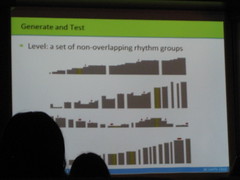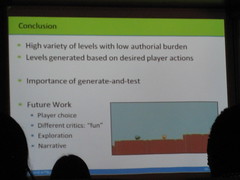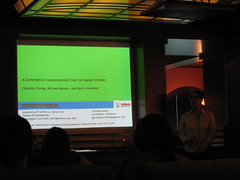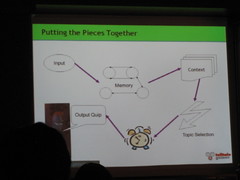The room was full, so I settled down on the floor listening to Gillian presenting ( Rhythm-Based Level Generation for 2D Platformers, Gillian Smith, Mike Treanor, Jim Whitehead and Michael Mateas). I started to empty my handbag… and found the camera. Happily I took this photo:

And this:

At least I was in time to listen to Christina present her generative conversation tool for game writers. She has built in cooperation with Telltale Games, and thus gotten continuous input from game writers using the system.

The system generates small talk, which is related to a “topic”, that proposes a “fact” on the topic, and results in a “quip” – the actual dialog line. The speakers in the application are zombies in a cocktail party environment, very forgiving and charming. Strike of genius, since then a user would be impressed of the intelligence of the zombie, rather than disappointed in a presumed human.
This is the pieces of the system:

Parameters used by the conversational agents include Alcohol, appropriateness and silence tolerance. The influence of alcohol (it’s a cocktail party context) increases the threshold for appropriateness, while it decreases the memory for dialog lines, thus possibly generating less appropriate and repetitive dialog (i.e. the characters don’t remember what they just said). The agents have different levels of tolerance to silence, so an agent with low tolerance would start talking quicker if there is an awkward pause due to inappropriateness. For topic generation input is taken from… I can’t remember if it was from word net or concept net. But from a net. Great work this is. It will be exciting to see the progression of it.